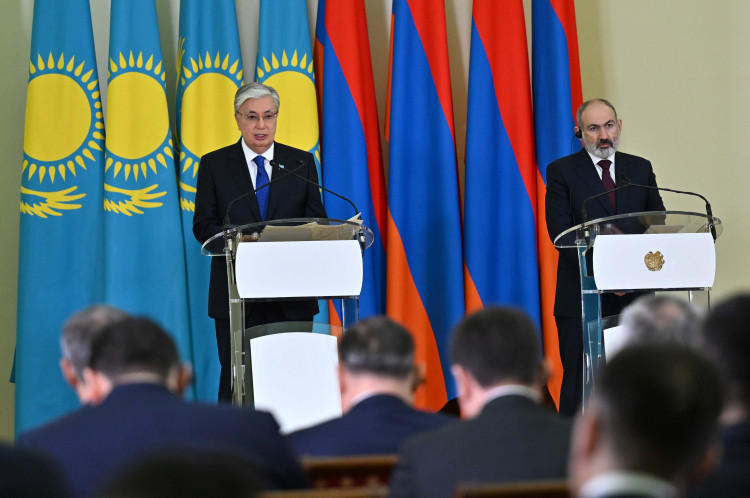BAKU, Azerbaijan, November 19. On November 20-21, Armenian Prime Minister Nikol Pashinyan will pay an official visit to Astana. During the talks, the sides will discuss economic cooperation and strategic directions for engagement. For Yerevan, the visit represents an opportunity to strengthen resource supplies and explore new transport routes through the region.
Today, Armenia is almost entirely dependent on imports. The majority of supplies come from Russia, the country’s largest trading partner. In the first eight months of 2025, trade between the two countries amounted to about $4.5 billion, roughly one-third of Armenia’s total foreign trade turnover for that period (around $13 billion in total). More than half of this sum, over $2.7 billion, was spent on importing key food products, industrial equipment, and machinery. By comparison, trade with the EU during the same period reached about $1.3 billion, and with China - less than $900 million.
Supplies of machinery and equipment, vehicles, food products, and chemicals are especially crucial for Armenia. These goods are essential for the functioning of the economy and daily life, and most still come from Russia. This dependence makes the country vulnerable to external shocks, increases the risk of delays and additional costs, and limits its ability to respond quickly to market changes.
In this context, direct deliveries from Kazakhstan become a strategic option for Armenia. Such a route would shorten delivery times, reduce costs, and minimize risks associated with transit through third countries. Grain, industrial goods, and energy resources from Kazakhstan could provide a reliable alternative, ensuring stability and economic security.
Already today, thanks to Azerbaijan, Yerevan receives Kazakh wheat. Baku has played a key role in organizing transit, allowing goods to pass through its transport network. Speaking during a press statement with Kazakh President Kassym-Jomart Tokayev on October 21, President Ilham Aliyev announced that Azerbaijan has lifted all restrictions on the transit of goods to Armenia that had been in place since the occupation. "I believe this is a clear indication that peace between Azerbaijan and Armenia exists not only on paper but also in practice," President Ilham Aliyev said.
The first train carrying Kazakh wheat, traveling through Russia, Azerbaijan, and Georgia, has already arrived in Yerevan. The national grain operator reported that a 15-car train carrying around 1,000 tons successfully tested the new route. Looking ahead, Azerbaijan is expected to become a reliable transport corridor for regular deliveries, with monthly grain volumes potentially reaching 15,000–20,000 tons.
Deliveries remain challenging: cargo passes through several countries, increasing transportation costs and the risk of delays. Currently, goods from Kazakhstan travel through Azerbaijan, then by rail to Georgia, and pass through an additional customs checkpoint when entering Armenia. For strategic cargoes, such as millet, this results in significant costs.
For Armenia, a faster and more direct route is crucial, and this is where the TRIPP project (The Trump Route for International Peace and Prosperity) comes into play. This transport corridor, which will be part of the Middle Corridor, will connect China and Central Asia with Europe, doubling transportation volumes and providing access to Türkiye and the Mediterranean.
The importance of Baku for regional transport and economic links has long been recognized. Azerbaijan’s recent inclusion as a full participant in Central Asia’s advisory meetings is further confirmation of this fact. Today, Baku serves as a key logistics hub: its ports, railways, airports, and Caspian fleet enable the handling and transportation of large volumes of cargo from East to West and back.
The TRIPP project can only be realized if a peace agreement is reached between Yerevan and Baku. Only then will Armenia gain access to international infrastructure and economic benefits. Positive signals have already come from the Armenian side: Pashinyan has stated that by mid-2026, the legal framework for the project is expected to be finalized, with construction of the railway to begin by the end of the year, followed by power lines and a gas pipeline along the route.
Thus, Pashinyan’s visit to Astana has several strategic goals: strengthening economic cooperation with Kazakhstan, expanding supplies of food and industrial goods, supporting infrastructure projects, and demonstrating readiness to improve relations with neighboring countries in practice.
However, the key takeaway is clear: without Azerbaijan, none of these plans can succeed. Any major transit project in the region, including TRIPP, is impossible without Baku, which controls strategically important routes and infrastructure. Azerbaijan has already created the necessary conditions, but requires, in return, the signing of a peace agreement and security guarantees.
It appears that Yerevan is signaling its willingness to act constructively, sending positive signals to the international community and showing readiness for practical cooperation. Pashinyan can negotiate with Kazakhstan and other partners, explore new routes and investments, but without Baku, these initiatives will remain on paper. Without Azerbaijan, no route will become a reality, no delivery will be optimized, and no infrastructure project will be implemented.
The success of Pashinyan’s visit to Astana hinges on progress in the Yerevan-Baku relationship: without a peace agreement with Azerbaijan, any further steps will remain only words and declarations, no matter how strategically significant the visit to Kazakhstan may be for Armenia.







